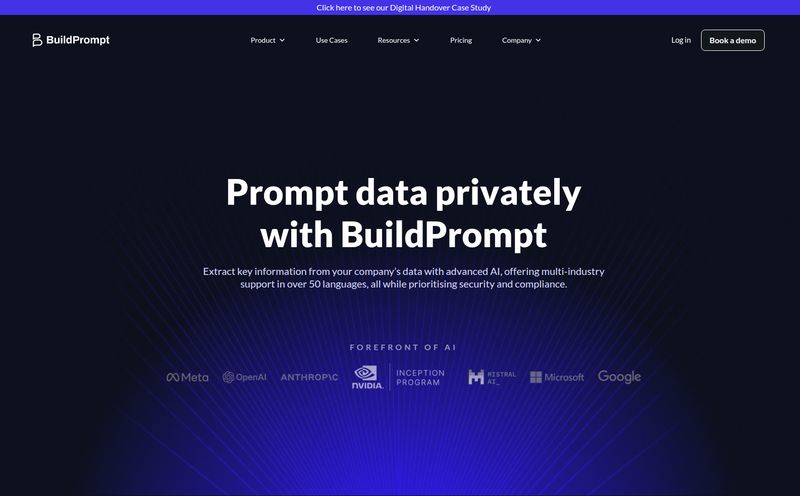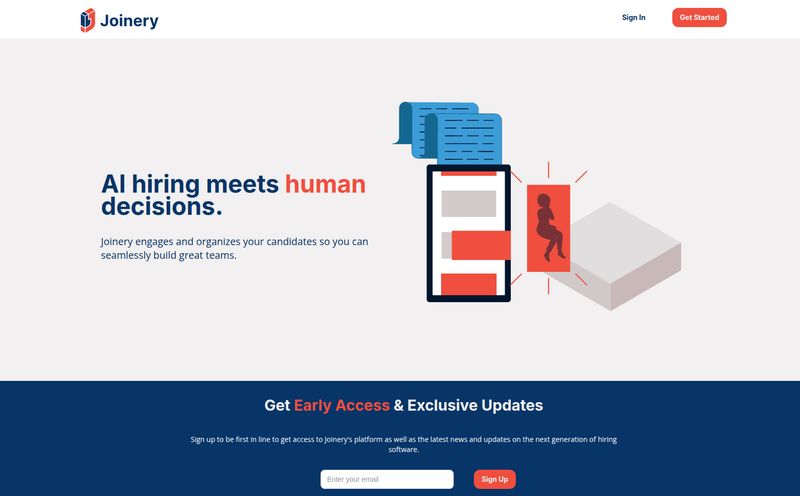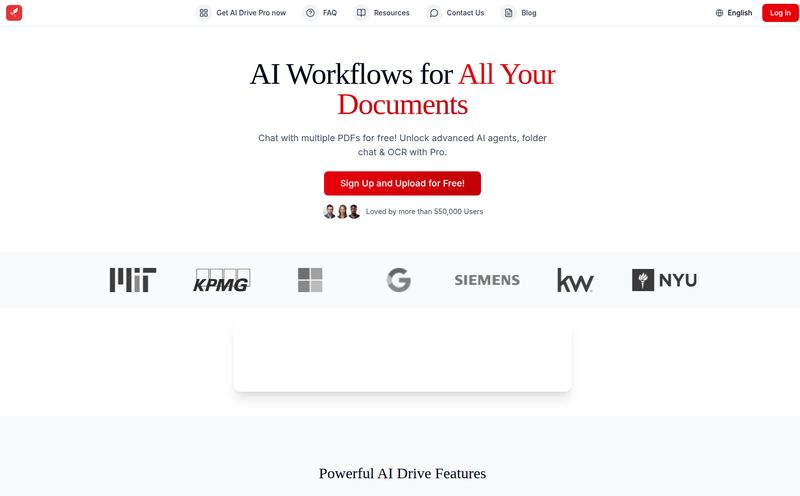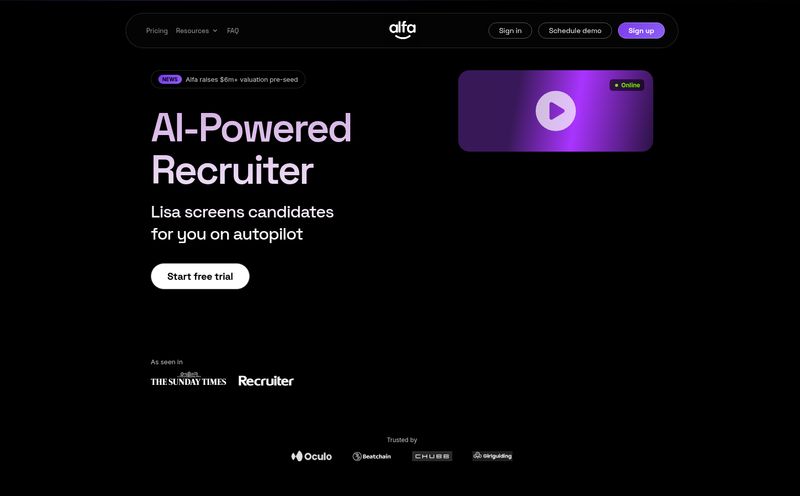If you’ve ever been on the hiring side of the table, you know the feeling. You post a job for a specialist role, something you need a real pro for, and within 48 hours your inbox looks like a clown car exploded. You're buried under a mountain of 200+ resumes. Some are great. Many are... wildly off-base. And a good chunk are just low-effort, copy-paste applications hoping something sticks.
I’ve spent more late nights than I care to admit, fueled by stale coffee, sifting through CVs that felt more like archaeological digs. You're searching for that one golden artifact, that perfect candidate, but you're mostly just covered in dirt. It’s a numbers game, they say, but it's a game that burns out hiring managers and costs a ton of time and money.
So when a tool like QuickScreen.ai comes along, promising to use AI to be my personal recruiting assistant, my ears perk up. But I’m also a skeptic. I’ve seen a lot of “AI-powered” solutions that are just fancy spreadsheets with a new coat of paint. Is this one different? I decided to take a closer look.
So, What is QuickScreen.ai, Really?
At its core, QuickScreen.ai is an automated candidate screening platform. But that's a bit of a dry, corporate way to put it. Think of it more like a super-smart filter for your applicant pool. Instead of you manually reading every single CV to see if they meet the basic requirements, QuickScreen does the heavy lifting.
It’s designed to solve that classic “needle in a haystack” problem. The platform generates custom screening questions based on your job description and the candidate’s own CV. It then analyzes their answers, scores their compatibility, and presents you with a clean, sorted list of people who are actually worth your time. The goal is to let you focus your energy on interviewing the right people, not just the first fifty who applied.
How QuickScreen.ai Works in the Real World
The process itself seems refreshingly straightforward, which I appreciate. There are no convoluted 12-step setups here. It boils down to four main phases.
1. Create a Job Application Link
First, you set up your job posting within the platform. This generates a unique application link. You then share this link on LinkedIn, your careers page, job boards—wherever you'd normally post an opening. Simple enough.
2. Candidates Submit Their CVs
Applicants click your unique link and submit their CV directly through the QuickScreen portal. This is a nice little touch because it immediately centralizes everything. No more chasing down applications from five different email threads and two job sites.
3. The AI Works its Magic
This is where it gets interesting. Once a candidate submits their CV, the AI gets to work. It reads the resume and your job description and then—and this is the cool part—it generates a handful of specific, relevant screening questions for that individual applicant. It's not a generic quiz; it's a personalized first-pass interview.
4. Receive AI-Analyzed Results
Finally, you get a dashboard with the results. You don’t just get a pile of documents. You get a ranked list of candidates with a “compatibility score,” key highlights from their CV pulled out, and even constructive reviews. It’s all designed to give you an at-a-glance understanding of who you should be talking to next.
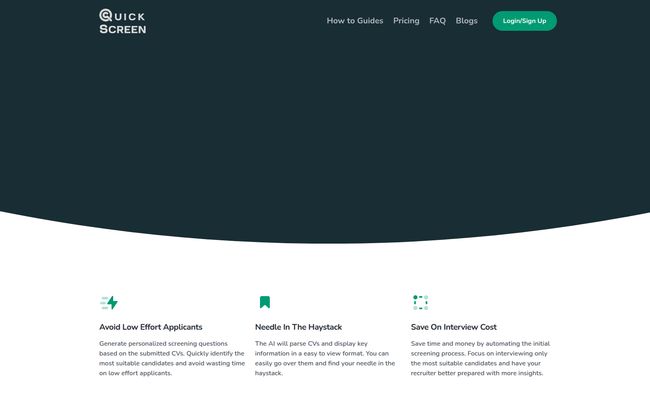
Visit QuickScreen.ai
The Standout Features That Matter
A lot of platforms boast about features, but I’m always looking for the ones that actually solve a problem. Here’s what stood out to me about QuickScreen.ai.
AI-Generated Questions are a Game-Changer
This isn’t just a static Google Form. The fact that the AI tailors questions based on the candidate’s resume is brilliant. If someone's CV says they have “experience with Google Analytics,” the AI might ask a question to probe the depth of that experience. This immediately weeds out people who just padded their resume with keywords. It forces a little bit of effort, which is a fantastic way to filter out the spray-and-pray applicants.
Smart CV Parsing and Compatibility Scoring
Let's be honest, nobody enjoys reading CVs formatted in 12 different ways, some with weird fonts and two-page-long objective statements. The CV parsing feature pulls the key info into a standardized, easy-to-read format. The compatibility score on top of that is just the cherry on the cake. It turns the messy, subjective process of initial screening into something much more data-driven. It's not about replacing a recruiter's intuition, but about giving that intuition a much better starting point.
The Big Question: What's the Price Tag?
Alright, let's talk money. A tool is only useful if you can afford it. QuickScreen.ai uses a subscription model with three main tiers, which seems pretty standard for SaaS platforms these days. I've broken it down here.
| Plan | Price (per user/month) | Key Features & Limits | Best For |
|---|---|---|---|
| Basic | $10 | Up to 3 jobs, up to 100 applicants, Integrations | Solopreneurs, very small businesses, or those wanting to test the waters. |
| Pro | $30 | Up to 10 jobs, up to 1000 applicants, all Basic features + Post Screening Workflows & Custom Tests | Growing small to medium-sized businesses with regular hiring needs. |
| Advanced | $87 | Unlimited jobs, unlimited applicants, all Pro features | HR departments, recruiting agencies, or companies in high-growth mode. |
Frankly, the pricing seems very reasonable. The Basic plan at $10 is a no-brainer for any small shop that hires even a couple of times a year. For most growing businesses, the Pro plan at $30 feels like the sweet spot, offering enough capacity without a huge financial commitment. The jump to Advanced is for the real power users.
The Good, The Bad, and The AI-Powered
No tool is perfect. As a professional reviewer, I believe in giving you the full picture, not just the marketing spiel. So, here’s my honest breakdown.
What I Liked (The Pros)
The time-saving aspect is undeniable. Automating that first screening pass could genuinely give hours back to your week. This directly leads to a higher quality of hire, because you're spending your valuable interview time with pre-vetted, engaged candidates. I also think it improves the candidate experience; it's a clean, modern process that shows you respect their time, too. For any overworked recruter or small business owner wearing the HR hat, this is a massive reduction in manual grunt work.
A Few Things to Keep in Mind (The Cons)
Okay, it's not pure magic. There is some initial setup. You still have to create the job postings and make sure your criteria are clear. Secondly, the tool's effectiveness hinges on the quality of the AI's analysis. While it looks impressive, you'll probably want to customize the screening criteria for very specialized or nuanced roles. You can't just set it and forget it entirely—you still need to be the human in the loop. It’s an assistant, not a replacement.
Final Verdict: Is QuickScreen.ai a Worthwhile Investment?
After looking it all over, I’m genuinely optimistic about QuickScreen.ai. It seems to be one of those tools built to solve a real, nagging problem in a smart way. It's not trying to be an all-in-one HRIS monstrosity. It does one thing—candidate screening—and appears to do it well.
Who is it for? I’d say this is a fantastic tool for small-to-medium-sized businesses, startups, and any company that doesn't have a massive, dedicated recruiting team. If you're the person who groans when you see the applicant count ticking up, this could be your new best friend.
Who might not need it? If you only hire one person a year for a role you know everyone in town, you can probably skip it. Likewise, massive enterprises with deeply embedded, complex Applicant Tracking Systems (like Workday or Taleo) might find this a bit too lightweight, though it could still be useful for specific departments.
Ultimately, for a small monthly investment, the potential return in saved time and improved hiring quality seems more than worth it. It’s a smart application of AI that doesn’t feel like a gimmick.
Frequently Asked Questions (FAQ)
- How does QuickScreen.ai actually generate the screening questions?
- It uses AI to analyze both your job description and the specific content of a candidate's submitted CV. It then creates unique questions to verify skills or probe deeper into the experiences mentioned, making the screening specific to each applicant.
- Can I customize the screening criteria?
- Yes. While the AI provides a strong baseline, you can provide specific instructions and customize the criteria to ensure the screening aligns perfectly with the unique needs of your role.
- What kind of platforms can it integrate with?
- The site mentions integrations, which typically means it can work alongside your existing job boards and HR software. The goal is to funnel applicants from various sources into one centralized screening process.
- Is it difficult to set up?
- Based on the workflow, it seems designed for ease of use. The process involves creating a job posting to generate a link, which is a fairly standard procedure. It's not a complex enterprise software installation.
- Is QuickScreen.ai just for tech roles?
- Not at all. While it's great for technical roles where specific skills are easy to query, its ability to analyze any CV and job description makes it suitable for marketing, sales, operations, and virtually any professional role.
A Smarter Way to Hire
Hiring is always going to have its challenges. There's no silver bullet. But tools like QuickScreen.ai represent a significant step in the right direction. By handing off the most tedious, time-consuming part of the process to a smart assistant, it lets us focus on the most human part: connecting with great people. And in my book, that’s a win.
